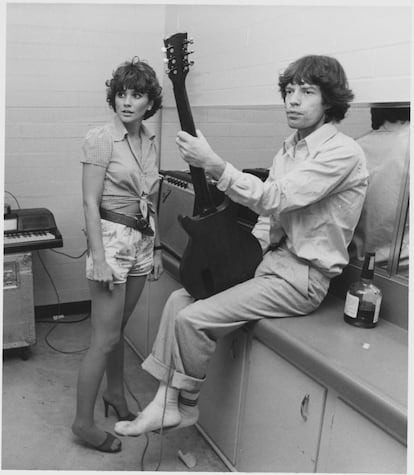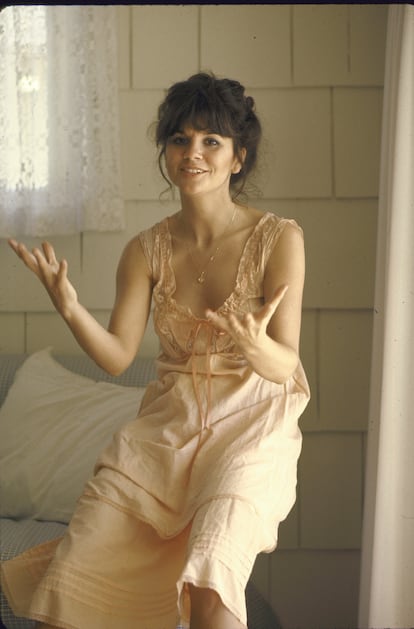Being Linda Ronstadt, sex icon in spite of herself: the biopic that will portray her struggle in the rock world
Retired for more than a decade due to serious health problems, the Arizona singer’s love affairs and life are to be brought to film by Selena Gomez

Linda Ronstadt retired from music on August 23, 2013, citing health conditions that prevented her from singing. She attributed her declining health to a tick bite and a botched shoulder operation that caused her hands to tremble. Initially, she believed it was a muscular or mechanical issue, leading to an eight-year delay in consulting a neurologist. To her surprise, the neurologist’s diagnosis revealed a form of Parkinson’s called progressive supranuclear palsy. After four decades of hits and over 100 million records sold, Ronstadt reluctantly acknowledged that she could no longer sing.
Even though we can now only listen to Ronstadt’s mezzo-soprano voice on her many recordings, the singer’s legacy and impact on pop culture continue to thrive. Selena Gomez recently announced on Instagram that she will star in the first biopic about Ronstadt, sharing her journey as a singer of Mexican ancestry. David O. Russell (Silver Linings Playbook, American Hustle) will direct, but no other details have been revealed.

The acting challenge ahead for the star of Only Murders in the Building is immense. Condensing the remarkable life of the singer who won eleven Grammy Awards and is the only woman to have five consecutive platinum albums, into a two-hour film seems almost as daunting as covering Ronstadt’s incredible range of musical genres and styles. The versatile singer could do it all — rock, pop, opera, country, jazz and even Broadway. Known for hits like Blue Bayou, You’re No Good, and Long Long Time (featured in The Last of Us TV series), Ronstadt knew from a young age that she wanted to be a singer instead of a nurse like many of her Tucson friends. When asked how she was so sure about her calling, Ronstadt said, “People sing for many of the same reasons the birds sing. They sing for a mate, to claim their territory, or simply to give voice to the delight of being alive on a beautiful day.”
Linda Ronstadt exemplifies the struggles, desires and joys of a generation. Raised in a music-loving family, her father was a frustrated singer who was a great inspiration for his daughter. Some of her earliest songs were the same ones he sang in the family-owned hardware store. Because of anti-Mexican racism in Arizona, she was strictly forbidden to speak Spanish in school. Yet the all-Spanish album she recorded late in her career, Canciones de mi padre (Songs of My Father, in English), was very successful. In an interview with The New York Times, Ronstadt said she felt racism in America was getting worse, not better.
Ronstadt’s childhood experiences had a profound impact, shaping her into one of the most outspoken activists for social justice in the United States over the past 50 years. She has a special passion for migrant rights and fearlessly confronts conservative forces even if it could harm her career. Ronstadt is especially hostile toward Donald Trump and will only refer to him as “the 45th president of the United States.” “I don’t say his name because he’s like the bad guy in Harry Potter — Voldemort.”

Ronstadt was always rebellious. At the age of 12, she turned down a marriage proposal from a Mexican kid named Mario, who was five years her senior. Two years later, Ronstadt started a group with her siblings, Peter and Gretchen, and performed in Tucson cafés. She dropped out of college after one term and headed to Los Angeles to pursue her dream at the age of 18. The singer who started out with only $25 a week for room and board now boasts a fortune of approximately $130 million.
After making a name for herself as part of the folk rock trio The Stone Poneys, Ronstadt launched a stellar career as a solo artist. She didn’t enjoy life on the road, but no one could fill stadiums and sell records in the late 60s and early 70s like Linda Ronstadt. Sharing her stories was her way of conquering stage fright that was often so severe she once hoped to get run over by a bus to avoid performing. The world of rock & roll in that era was a nightmare for women pursuing independent careers. Ronstadt’s memoirs recount numerous incidents of sexual harassment, including one involving a drunken Jim Morrison when she opened for The Doors. Music industry executives tried to blackmail her into sexual favors. Despite it all, Ronstadt remained strong. “There are predators all around and you have to be alert,” wrote Ronstadt.

She was an icon and a reluctant sex symbol, posing in red lingerie for photographer Annie Leibovitz on the cover of Rolling Stone magazine in 1976. Ronstadt later said Rolling Stone had used that cover against her wishes, as she always rejected the sex-symbol label and the dehumanization of media fame. “For me, it was tough to wear anything more than Levis and a baggy sweater — like I was dressed to clean someone’s house.” She never married, but her love life included former California Governor Jerry Brown, Mick Jagger, Robert Plant, Bill Murray, Jim Carrey and George Lucas (to whom she was once engaged). After her relationship with Lucas ended in the late 1980s, Ronstadt adopted a daughter, Mary Clementine, and later a son named Carlos. As a mother with a fading voice, Ronstadt gradually stepped back from the stage in the early 2000s. Although her last recording was in 2010, the renowned ‘first lady of rock’ continues to sing. During one of her recent public appearances in 2022, Ronstadt said, “Though it’s not quite the same... I can still sing in my mind.”
Sign up for our weekly newsletter to get more English-language news coverage from EL PAÍS USA Edition
Tu suscripción se está usando en otro dispositivo
¿Quieres añadir otro usuario a tu suscripción?
Si continúas leyendo en este dispositivo, no se podrá leer en el otro.
FlechaTu suscripción se está usando en otro dispositivo y solo puedes acceder a EL PAÍS desde un dispositivo a la vez.
Si quieres compartir tu cuenta, cambia tu suscripción a la modalidad Premium, así podrás añadir otro usuario. Cada uno accederá con su propia cuenta de email, lo que os permitirá personalizar vuestra experiencia en EL PAÍS.
¿Tienes una suscripción de empresa? Accede aquí para contratar más cuentas.
En el caso de no saber quién está usando tu cuenta, te recomendamos cambiar tu contraseña aquí.
Si decides continuar compartiendo tu cuenta, este mensaje se mostrará en tu dispositivo y en el de la otra persona que está usando tu cuenta de forma indefinida, afectando a tu experiencia de lectura. Puedes consultar aquí los términos y condiciones de la suscripción digital.









































